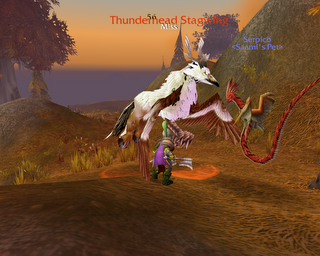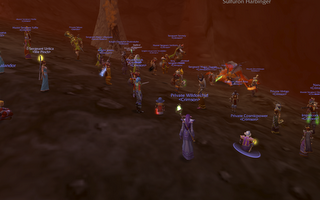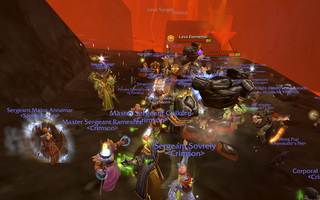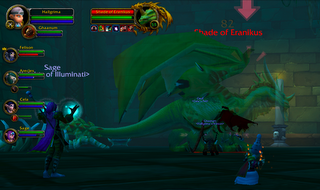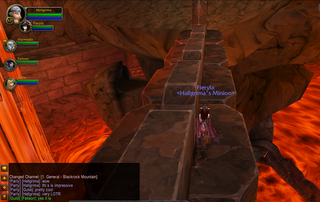First, an apology and explanation to my doc'l gamers. You must have been wondering when I was going to say more. Well, I am one of those ex-English majors that has to swim around in it, immerse in the phenomenon, and wait for my muse, for my insight to surface. It is beginning to do so and this entry is occasioned by my need to convert some mental notes and musings into text.
I was working on a green quest in Tynaqua's quest log. She's a lvl 30 rogue troll. I hate it when quests go gray. This pesky quest has been driving me nuts. It's hard for me. I've tried it on several different days, starting back when it was yellow, and I've died a thousand deaths, so to speak. In exasperation, I checked in to the community knowledge base, thotbott, where I read the usual "I soloed this as a level 23 priest" and such. But this time, I was really compelled to understand why I could not accomplish this task, and then I found an entry by a rogue.
As my kid might say, "OMG!" Here's the post, with boldface player moves I have added for discussion:
Cake With Rogue
Score 0.1 Vote: [-] [+] by Kynmore, 2.5 months ago
Ding'ed to 25 just before i got to him. He has his 22 escourt, which spawns a 3rd escourt, the damned bot.
Cake! First off, use distraction to get Gerenzp to look away, then sap his ass. Take out the escourt, dont worry about her bot. Use vanish, and the bot will go away. Then, distract Gerenzo again, Ambush his ass, and take his arms.
Doesn't get more simple than that.
My jaw dropped when I read this, not because it held the key (because it still might have been more than I could manage), but because it demonstrated a very deep knowledge of the rogue skills
and, thereby, a creativity or
cognitive flexibility with those skills and that knowledge.
An aside for those unfamiliar with cognitive flexibility. Paragraph one is a defintion. Paragraph two is the reason I have not embraced it much.
Cognitive flexibility theory focuses on the nature of learning in complex and ill-structured domains. Spiro & Jehng (1990, p. 165) state: "By cognitive flexibility, we mean the ability to spontaneously restructure one's knowledge, in many ways, in adaptive response to radically changing situational demands...This is a function of both the way knowledge is represented (e.g., along multiple rather single conceptual dimensions) and the processes that operate on those mental representations (e.g., processes of schema assembly rather than intact schema retrieval)."
The theory is largely concerned with transfer of knowledge and skills beyond their initial learning situation. For this reason, emphasis is placed upon the presentation of information from multiple perspectives and use of many case studies that present diverse examples. The theory also asserts that effective learning is context-dependent, so instruction needs to be very specific. In addition, the theory stresses the importance of constructed knowledge; learners must be given an opportunity to develop their own representations of information in order to properly learn.
Source: http://tip.psychology.org/spiro.htm
So I had gotten all these skills: vanish, sap, distraction. I could also take people out quite effectively. I'm a very good fighting rogue. But when I first got
vanish, at lvl 22 I read its functionality and made a judgment about it. True, I went out and bought a 5-stack of flash powder, which it requires. But I put it on a secondary bar, for special case uses, and promptly forgot about it. Why? Because it has a 5 minute cool down, which means you use it once in a situation. Somehow I missed important features, such as its duration, 10 seconds (long time in a battle), and this:
Also breaks movement impairing effects. All aggro'd mobs on Rogue will exit combat phase and return to their original locations or turn to other players if the rogue is in a party (WoWWiki entry).So the lvl 25 rogue who wrote the entry understood vanish better than I do. But, more importantly, he understood how to string it together with a set of other talents, e.g., distraction (another move on my
rare use tool bar) to experience the quest as a piece of cake.
How did I miss this?
Immediately I thought of last night's run with Twink and Clivenar and Meranda (me) and Orosquee to finish off the
seal of wrynn chain. As we stood around in the garden in the keep, waiting our turn to kill the spy, another player, a kid we "know" as Denaly, was jumping and running around us like...like...well all I can think of is a balloon that has been blown up and let go of, whirling around the room in random ways.
I found it mildly annoying, more amusing, but just kid behavior. He was also telling us he'd managed 500 HK (honor kills) in BGs that day. OMG, that's an amazing amount. This morning, while I pondered the rogue quest problem, those two fact collided. In BGs that very behavior is a valuable skill and strategy for rogues. I had an idea. I was reminded of ethology studies of baby primates play-fighting with each other to learn to be adult primates fighting for real. Denaly, and my own kid, Orosquee, play like this inside the game at idle moments. A lot times we find it hugely annoying, but it may serve a similar novice practice function. It may open up possibilities for them to experience their skills/moves separate from any particular use-context that would make them
a tool for X, and instead more deeply embue them with the context of things I can do as a rogue, and thus available to me in all my rogue contexts. We adults, we encounter a new talent and think about how it fits our game play -- our past game play -- and make a decision about its role and utility, and promptly pigeon hole it.
After all, quests are deliciously
ill-defined problem spaces that ask us to just get the jorb done however we see fit, with the tools and insights at our disposal. I certainly limit what's at my disposal. I didn't
see vanish as a tool I might use on my quest. I just didn't see it. When I read the entry, my reaction was first, jees that's a lot of stuff to remember to do... and then, DOH! only for me, the dweeb who has locked her tools in a fixed game play style. I'm just burning through the levels with the rogue. I want to level her up. And ironically that very reconceptualization of quests as barriers to levels is what made the task hard. Hey stupid, it's a R O L E playing game. As Woody Allen intones in the film, Antz,
be the ball. I need to BE the rogue.
And I know this. I have read earlier Thotbott postings about some grinding task that someone was bitching about, which occasioned the reply posting that went something like this:
Dude, that's how BLizzard gets you to practice that skill. It's better than some stupid tutorial; you get points for it. So STFU and stop complaining, n00b. How could I read that, agree with and get it, and still not get it?
Wow, am I a n00b, eight months later, despite my several high level characters!
And, this returns me to the initial point. I want to look through the postings for evidence of this sort of exploration. I want to watch players like Denaly and Akmalla, both hugely annoying at times when they are goofing around with new skills (a reconstruction of the experience...smile).
Now at some preconscious level I knew this. I had already begun looking around in the literature for work on the role of play, beyond the ethologist point of view though. Dorothy Holland and LS Vygotsky, himself, have things to say about play and learning, and so I am heading back to reread books they've written that I already own.
DOH!



